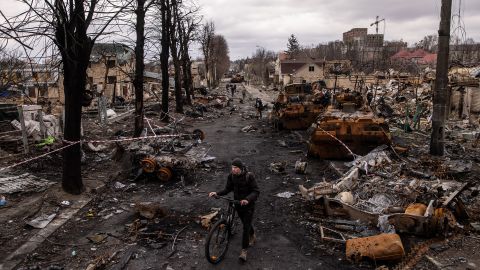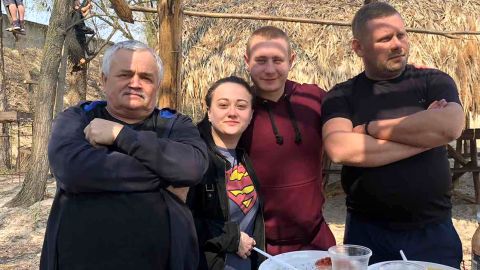When Russian troops invaded Ukraine and began closing in on its capital, Kyiv, Andrii Dereko begged his 22-year-old stepdaughter Karina Yershova to leave the suburb where she lived.
But Yershova insisted she wanted to remain in Bucha, telling him: “Don’t talk nonsense, everything will be fine – there will be no war,” he said.
With her tattoos and long brown hair, Yershova stood out in a crowd, her stepfather said, adding that despite living with rheumatoid arthritis, she had a fiercely independent spirit: “She herself decided how to live.”
Yershova worked at a sushi restaurant in Bucha, and hoped to earn her university degree in the future, Dereko said: “She wanted to develop herself.”
As Russian soldiers surrounded Bucha in early March, Yershova hid in an apartment with two other friends. On one of the last occasions Dereko and his wife, Olena, heard from Yershova, she told them she had left the apartment to get food from a nearby supermarket.
“We did not think that Russians would reach such a point that they would shoot civilians,” he said. “We all hoped that at least they would not touch women and children – but the opposite happened.”
When weeks went by without a word from Yershova, the family became desperate for news. Her mother left a message on Facebook begging anyone who knew what had happened to her to get in touch.
She was told by friends that images of a dead woman with similar tattoos to Yershova’s – which included a rose on her forearm – had been posted on a Telegram group set up by a detective in Bucha who was trying to identify hundreds of bodies found in the town after Russian troops withdrew from the area two weeks ago.
Dereko says the images, seen by CNN, show his stepdaughter’s mutilated body. Police told the family she had been killed by Russian soldiers.
It looked like she was tortured or put up a fight, he said. “They mutilated her. They shot her in the leg, and then gave her a tourniquet to stop her bleeding. And then they shot her in the temple.”
Dereko also believes Yershova was sexually abused by Russian troops. “The [police] investigator hinted” that she had been raped, he said.
CNN has not been able to independently verify this claim. Officers who oversaw the case declined to comment to CNN due to the ongoing investigation. CNN has reached out to Kyiv prosecutors for comment.

The Dereko family’s agonizing wait for answers reflects the rising anxiety amid reports of wartime rape in the country.
Ukrainian officials say Russian forces have been sexually abusing women, children and men since the invasion began, using rape and other sexual offenses as weapons of war.
Human rights groups and Ukrainian psychologists who CNN spoke to say they have been working around the clock to deal with a growing number of sexual abuse cases allegedly involving Russian soldiers.
A report by the Organization for Security and Cooperation in Europe (OSCE), released on April 13, found violations of international humanitarian law by Russian forces in Ukraine, noting that “reports indicate instances of conflict-related gender-based violence, such as rape, sexual violence or sexual harassment.”
“Russian soldiers are doing everything they can to show their dominance, and rape is also a tool here,” said psychologist Vasylisa Levchenko, who founded a service that provides free counselling for Ukrainians suffering from war-related trauma.
Levchenko says her network, called Psy.For.Peace, has spoken to roughly 50 women from the Kyiv region who say they were sexually assaulted by Russian soldiers. She told CNN the group is dealing with cases including a 15-year-old and her mother who were sexually abused by pro-Russian Chechen soldiers, and the gang rape of another woman by seven soldiers – while Ukrainian detainees were forced to watch.
CNN has been unable to independently verify the account.
“The weapon [rape] is a demonstration of complete contempt for the [Ukrainian] people,” Levchenko said, adding that it is one which has an impact far beyond the victims of individual attacks: “There are people who feel guilty for not being able to do anything, guilty for surviving, for watching a person dying in front of them.”
Russia has repeatedly denied targeting civilians since the war began – a claim disproven by numerous attacks that have been verified by CNN and other news organizations. CNN has reached out to the Russian Ministry of Defense for comment.
Breaking morale
Alyona Krivulyak, who heads up a national hotline at La Strada-Ukraine – a group that campaigns against gender-based violence – told CNN that the hotline has received nine accounts of rape from around the country, the majority of them gang rapes of women.
“Rape is an instrument of war against the civilian population – an instrument of destruction of the Ukrainian nation,” she said.
Psychologist Alexandra Kvitko, who works on a hotline for trauma victims run by Ukraine’s ombudsman with the support of UNICEF, said she has heard dozens of accounts of conflict-related sexual violence.
“This amount of sexual violence, this kind of brutality has never happened before,” she told CNN.
In the five years she has been practicing, Kvitko said she had only dealt with 10 cases of sexual assault before the invasion. “Now, in a few weeks of work I have 50 cases, and these are not only women – these are children and boys and men,” she said.
Rape is being used to break the morale of Ukrainians, she said, “to stop people from resisting.”
Kvitko said that when one client ran out into the street to stop soldiers from raping her 19-year-old sister, “a military man came up, grabbed her and said: ‘No! Look! Tell everyone that this will happen to every Nazi whore.’”
Any such act of conflict-related sexual violence – rape, forced prostitution, sexual slavery, forced pregnancy – is considered a war crime and a breach of international human rights laws, said Charu Lata Hogg, the founder of human rights organization the All Survivors Project, which researches conflict-related sexual violence against men.
“Whether that is triggered within the context of a patriarchal and militarized masculinity, or whether it is exerted as a specific aim of warfare or whether it happens because people find a population at their mercy and therefore decide to inflict further harm,” it is still a war crime, Lata Hogg told CNN.
But even as Ukrainian and international prosecutors from the International Criminal Court (ICC) collect evidence of Russian war crimes, many sexual abuse victims are not yet ready to speak to officials about their ordeal, Levchenko said.
“All our psychologists must provide women with the contacts of the prosecutor’s office so that when they are ready, women can seek legal assistance,” psychologist Levchenko said, adding that none of her clients has so far reached out to Ukrainian prosecutors.
Levchenko said many of the victims – women, men and children – need time to heal before speaking to the authorities.
On Friday Andrii Niebytov, the head of Kyiv’s police force, said his officers had only confirmed one suspected rape case so far in the region. “We have [heard] such reports from outsiders, but when we talk to women, they refuse to confirm or deny such information,” he said.

Horrific precedent
Reports of sexual violence often rise during times of conflict, and Ukraine has been no exception.
Volodymyr Shcherbachenko, director of the Eastern Ukrainian Centre for Civic Initiatives (EUCCI), told CNN that the country had seen cases of sexual violence being used as a weapon in 2014, when Russian-backed separatists seized territory in the country’s east after widespread protests called for closer integration to Europe.
A joint report in 2017 by Justice for Peace in Donbas and other rights groups like EUCCI documented cases on both sides of the conflict, including rape and attempted rape, sexual harassment, and coercion to watch sexual violence against others. “The most widespread form of sexual violence against women was rape,” the report added.
Lata Hogg, from the All Survivors Project, said that in the past month her group has had multiple accounts of sexual violence, “and the pattern of sexual violence emerging in this context is not dissimilar to those which have been documented in other contexts globally,” including during the conflict in Chechnya.
Grozny, the capital of Chechnya, was leveled by Russian forces in a brutal war in the 1990s and early 2000s. Human Rights Watch reported at the time that Russian soldiers had raped Chechen women in Russian-held areas.
Psychologist Levchenko worries that the true scale of Russian atrocities will only emerge when areas like Mariupol are liberated.
In occupied cities and towns, Russian forces “regularly visit women’s homes, can check their phones, their photos, social networks,” making it impossible for women to receive rape kits or other services, Krivulyak from La Strada-Ukraine said.
“This fear of armed people sometimes makes it impossible to ask for help, and this in turn makes it very difficult to document facts, which leads to problems around bringing [perpetrators] to justice,” she said.
Beyond the emotional trauma, “there is also a very high risk of unwanted pregnancies and sexually transmitted diseases,” which is why medical attention is so important, she said.
Shcherbachenko said EUCCI case workers are helping one local government worker in an occupied area of southern Ukraine who “was specifically raped in order to force her to cooperate.”
He said Russian soldiers had told her: “We will rape you again if you don’t do what you need to do … For me, this shows [Russian forces are using] sexual violence as [a] weapon.”
‘This time I couldn’t save her’
Rights groups say victims will shoulder the trauma of sexual abuse for the rest of their lives, while the families of those who died, like Karina Yershova, are left hunting for answers and dealing with the horror of happened to their loved ones.
Yershova’s body was found in a shallow grave in Bucha, alongside those of 65-year-old Natalia Mazokha and her husband, Victor, 64.
CNN pieced together the final moments of their lives.
Neighbors told the Mazokhas’ daughter Julia that Russian soldiers had dragged a wounded woman – believed to be Yershova – into her parent’s yard in the middle of March; Natalia tried to help her.
The soldiers returned two minutes later, when “mom was next to her [and] giving her help, and they [the Russians] shot her, shot my mother,” Julia Mazokha said. Her father was killed in the hallway of their home when he tried to find out what was happening.
“They lay in the yard for 10 days, as I understand it,” she said. The couple’s neighbors called her around March 20 to inform her that her parents had been killed.
Mazhokha said she had begged her parents to leave Bucha with her on March 12. “They didn’t want to go to [saying]: ‘No, we won’t go, we’ll be here. Everything will be fine,’” she said.

Andrii Dereko told CNN this is the second time his family has had to escape a Russian incursion. In 2014, they fled their home in the Donbas region as fighting broke out between Ukraine and Russia-backed separatists.
They lost everything – even family photos – but had managed to rebuild a new life in Irpin, the neighboring suburb to Bucha. Dereko became a taxi driver and did odd jobs to keep the family afloat.
But now they have been left with nothing again “because of the Russians,” he said. “At least the first time I saved my child, this time I couldn’t save her.”
His wife is so tired she is unable to cry, and all that is left in Dereko is rage.
“Who is to blame?” he asked CNN.
“Is the soldier who abused my child to blame? Or the one who brought him here in a tank? Or maybe the general who ordered the invasion of Ukraine is to blame? Or that stinking [Russian] President Vladimir Putin, who gave the order to mutilate the Ukrainian people?”
“I blame the entire Russian world – not just its military,” he said.
Source: www.cnn.com
